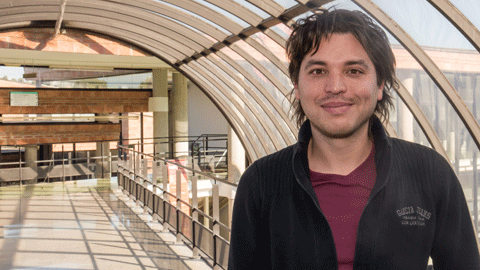"The land stops being a right and becomes a commodity"

28/10/2015
Leonardo van den Berg is a member of the Centre for Learning on Sustainable Agriculture (ILEIA), an independent organisation based in Wageningen (the Netherlands). He visited the Faculty of Veterinary Medicine on 22 October to give a talk on the concept of food sovereignty and its implications in all stages in food production and consumption, and also to take part, the following day, in a debating session aimed at finding a place for food sovereignty within academic activity.
The activities in which Mr van den Berg participated were organised by the Working Group on Education for Development in the Faculties (GEDEF- Veterinary Medicine), the Teacher Training and Innovation Unit-IDES, the Veterinary Medicine Students' Assembly, Community Action, Fundació Autònoma Solidaria, VSF- Global Food Justice and Barcelona City Council.
What is food sovereignty?
The important thing about the idea of food sovereignty is that it has been established jointly by a large number of people. The most popular definition was agreed on by over five hundred organisations of small farmers, fishers, forestry workers etc. It is people's right to decide on their own agricultural system based on their own values. Much of the food we eat today is controlled by multinational corporations: quality, price, etc. But we should be able to define our own food system.
So it's related to farming diversity.
Yes, food sovereignty takes this diversity into account. There are different systems, different values, even different tastes... So, people should have a right to create different food systems.
There seems to be a clash between the interests of the global food industry and small farming communities around the world. Why does the global food market harm farmers?
Partly from the way the global market in basic products works. Multinationals are interested in obtaining food and even land as cheaply as possible and that creates many problems for farmers. They are forced to compete with each other and keep lowering their prices, so they find it harder to survive. Meanwhile, large farm operations and even investment funds are buying up land, pushing the small farmers out. Land should be a right and it's turning into a commodity.
So are you against any kind of global food trade?
No, it's important for there to be some global food trade because, for example, in Europe we want to drink coffee and we can't produce it ourselves. But it has to be done properly, with small farmers being paid a fair price. That way, coffee producers could earn more by selling to us, but always for a fair price and using sustainable production methods.
What is the link between the development of food sovereignty and the fight against poverty?
In a way, food sovereignty is a response to poverty. It encourages people to use their own abilities to create sustainable food systems, to be independent and protect themselves from the multinationals that are partly responsible for poverty.
Could an industrial model be developed that is favourable to food sovereignty – one that respects the development of domestic markets and farming communities?
I think this is already happening in many parts of the world on a small scale. In the Netherlands, for example, farms that used to focus mainly on the global market are now starting to sell more in local markets. There are also initiatives towards community-supported agriculture: the consumers co-own the farm and pay the farmers a salary, which means the farmers are guaranteed a fair price however the harvest goes. That is food sovereignty too because there is direct contact between citizens and farmers and if farmers want to be paid a bit more, for example, they can ask the citizens directly. These are just small examples but they show how citizens can negotiate with farmers to create something more sustainable, to improve their lives.
Which governments across the world are applying policies that are favourable to food sovereignty?
The government of Ecuador has made food sovereignty part of its national policy. But, as often happens in politics, it tends to stretch the term and misuse it a little bit. For example, it includes GMO (genetically manipulated organisms) in food sovereignty as long as these are produced nationally.
And what about international institutions?
The FAO is paying more and more attention to the concept of food sovereignty, but is not really using the term yet. It is civil society organisations, such as Vía Campesina, that are promoting it the most strongly.
How did the food sovereignty movement come about?
It arose as a response to the neoliberal model of agriculture. It arose first among small farmers, fishers and forest dwellers, who defend their way of life under the banner of food sovereignty.
What role should the university play in spreading the idea of food sovereignty?
It should make it known and encourage debate on what food system we have in place and whether food sovereignty could be an alternative or not. Food sovereignty is all about recognising people's knowledge and values concerning food: both citizens and farmers. So the university could set up a dialogue between researchers and farmers to find out what farmers needs and values are. There are a lot of ways to go about this: you could bring farm people to the campus, send students out to the farms, give farmers a voice in defining research projects, etc.
What work is done by the Centre for Learning on Sustainable Agriculture (ILEIA)?
We showcase previously unknown success stories in agroecology, family farming and food sovereignty. We write about them in a magazine, Farming Matters, in which we try to show what farmers are doing. And we also try to analyse these successful cases to see what they have in common and how they can help us to move forward towards a more sustainable food system.